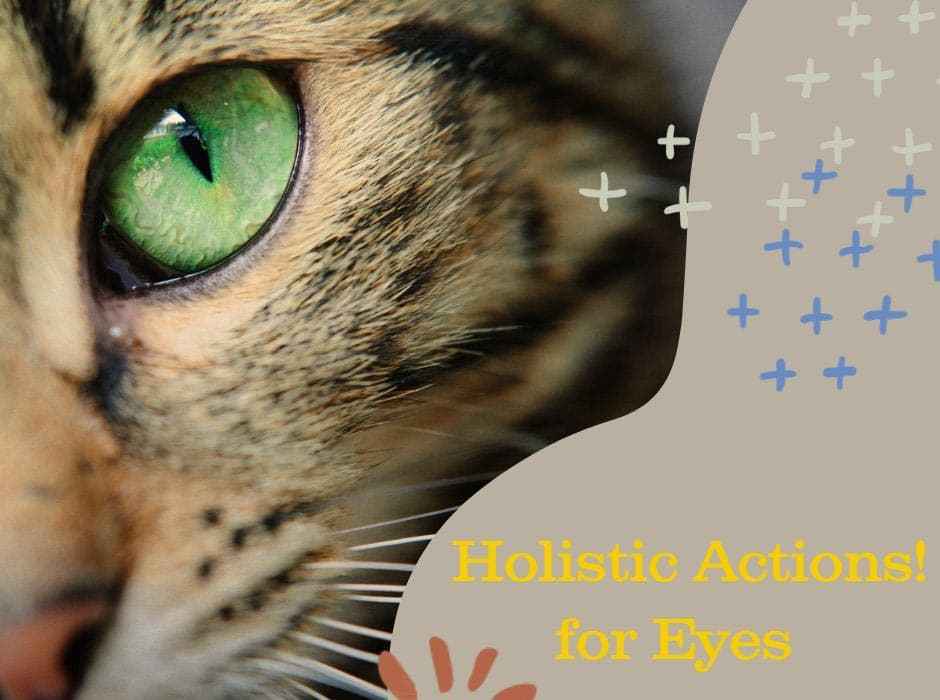DrMany cats have chronic problems with conjunctivitis (inflammation of the eye membranes). Often, the problem comes and goes. The eyes may be red, swollen, watery, crusty, or goopy.
Causes include:
- Infection
- Congenital defects (small or absent tear ducts)
- Facial conformation (Persian features)
- Scarring from previous infections.
Unlike humans, allergies are rarely involved. The most common cause of conjunctivitis in cats is viral infection, usually with a Herpes virus.
Herpes: The Most Common Cause
In cats, Herpes is an upper respiratory virus (not an STD); it’s also called “rhinotracheitis” and is one of the components of the combination upper respiratory/panleukopenia (feline distemper) vaccine for kittens. The vaccine does not actually prevent Herpes infection; its main function is to reduce the severity of the disease.
Herpes attacks the nerves and is painful. It usually causes quite a bit of redness and a watery discharge. It often attacks only one eye, producing a lopsided squint. Affected cats tend to be photophobic; that is, they squint against the bright light or try to avoid it altogether.
Nearly all cats are exposed to the Herpes virus as kittens. For most cats, no further problems occur. However, Herpes is a sneaky virus and likes to lie dormant until it gets a chance to get one up on the immune system. Because stress suppresses the immune system, cats under stress are particularly susceptible to recurrent Herpes flare-ups.
Importance of Diet
Diet is also a factor in feline Herpes. Corn is deficient in the amino acid lysine; as dry foods have, over the years, replaced meat with corn gluten meal and other poor quality ingredients, Herpes flares have become more common. Dry food is not good for cats for many reasons; this is just one more. Cats need a high protein, high moisture diet such as canned, homemade, or raw food. Long-term nutritional support with antioxidants, BioSuperfood, and other immune boosting supplements will also help prevent recurrences.
Antibiotics are ineffective against viruses, so conventional medicine doesn’t have a good treatment for Herpes.
Nevertheless, most veterinarians use topical eye drops or eye ointment containing antibiotics as a treatment. Steroids may also be included in such topical products; they will reduce pain and inflammation, although there is a risk that the immune suppressing effects of steroids will inhibit healing.
Holistic Treatment Options
There are several holistic treatment options for Herpes. One of the simplest is l-lysine, which is inexpensive and readily available at the health food store or drug store. It comes in capsules or tablets, usually 500 mg. Capsules are much easier to work with, if you can get them. The dose is 500 mg twice a day for 5-7 days (total 1,000 mg/day). Lysine has a slightly salty taste, and is easily disguised by mixing with wet food or meat baby food. If that seems like a huge dose for a cat, it is–but that’s what it takes to work. Once the acute episode is under control, a maintenance dose of 250 mg per day can be given indefinitely.
Stress management is an important part of treatment because herpes flare-ups are so commonly stress-related
To relieve irritation and wash viral particles from the eye, you can make a homemade saline solution. Use 1/4 teaspoon of table salt to 1 cup of water (room temperature). Three or four times a day, use a cotton ball to drizzle a small amount of saline into the cat’s eyes. Make the saline fresh each and every time, because bacteria could grow in the solution between treatments.
Another surprisingly effective treatment is “Willard Water.” This is a catalyst that theoretically changes the molecular structure of water. It is usually available at health food stores. Follow the directions on the bottle to make up a gallon at a time. Use this as the only source of drinking water for your cat. The effects are not scientifically explainable, but they are usually immediate–within a day or two–and dramatic.
Homeopathic remedies can also be very helpful for these kitties. A formula that Dr. Jean Hofve designed has proven to be exceptionally helpful: Only Natural Pet Eye & Upper Respiratory Treatment Homeopathic Supplement Remedy Another one, designed for people but works well for cats, is called Aeura.
Because herpes flare-ups are so commonly stress-related, stress management is an important part of treatment. Flower essences such as Spirit Essences are designed for this type of support. Additionally, all cats benefit from Play Therapy and Indoor Enrichment.
* If symptoms worsen or persist for more than a few days, a check by your veterinarian is warranted. Herpes can cause serious corneal ulcers that may result in loss of vision if untreated.

